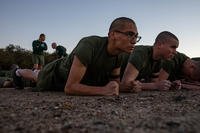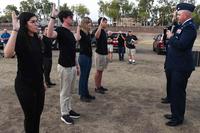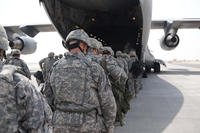In military basic training, you perform a great deal of guard duty.
Such guard duty is called sentry duty. I guess that the powers-that-be must feel there are a lot of criminals who are intent on stealing. Recruits guard military barracks' rooms most of the day. Only authorized people (your drill instructors and other recruits) are allowed to enter unescorted.
In Army, Navy, Marine Corps and Coast Guard basic training, you'll be assigned to guard other things as well as the barracks, just to give you a little extra practice. Of course, this guard duty practice has a serious purpose; the time may come when you have to guard something vital in the line of duty.
Tip: While Air Force basic training recruits pull guard duty (called dorm guard), they don't have to memorize any sentry rules. Air Force basic training troops perform dorm guard duties sitting at a desk behind a locked dormitory door with a list of written instructions. If a person isn't on the access list, the dorm guard simply does not open the door. If she is on the access list, the door is opened. What could be simpler?
Navy, Marine Corps and Coast Guard
The Navy, Marine Corps and Coast Guard have a dedicated list of rules that sentries must memorize and be able to recite word for word upon request. These rules are called the General Orders for Sentries, or sometimes just General Orders.
Tip: You're required to memorize the following in order so that you can recite a specific order number, if asked.
- To take charge of this post and all government property in view.
When you're performing sentry duties, you're in charge of your post. That means that no one except your training instructor, no matter what their rank, can change your orders. Even if a 4-star general approaches and demands that you let him pass, you can't do so if his name isn't on your access list. Only your training instructor can give someone who is not on the list permission to enter the barracks.
Warning: In basic training, other training instructors often try to bluff their way past recruits performing guard duties. If they succeed, that means they get to rub it in to your drill instructor. It also means that your drill instructor will probably have you for lunch.
When performing guard duty, you're also responsible to protect all government equipment and property that is within sight, even though it may be outside of the area of your assigned post. - To walk my post in a military manner, keeping always on the alert and observing everything that takes place within sight or hearing.
This means you don't slouch, you don't keep your hands in your pockets and you don't sit down. Always be vigilant by looking around you at all times. Don't let those tricky training instructors try to pull a fast one on you. If you see or hear anything unusual, don't ignore it -- investigate it. - To report all violations of orders I am instructed to enforce.
For example, if someone tries to trick his way past you, mark it in your logbook and report it to your training instructor, even if that person wasn't successful.
Use common sense. If it's 2 a.m. and your training instructor is sleeping, it can probably wait until first thing in the morning, unless your training instructor specifically has ordered you to wake him up if anything unusual happens. - To repeat all calls from posts more distant from the guardhouse (or the quarterdeck) than my own.
These days, sentries can usually make their reports from modern electronics, such as radios and field telephones. However, if a power outage or other communications problem occurs, the age-old practice of relaying information can be very important. Your training instructor may even order you to simulate a power outage or communications failure to see how you handle it. - To quit my post only when properly relieved.
This rule may seem evident, but I can guarantee you that at least one person during your time at basic will make the mistake of leaving his watch post and going to bed, if their relief is late. This mistake is very serious in basic training and will almost surely result in severe punishment.
Marine Corps version: To receive, obey and pass on to the sentry who relieves me, all orders from the Commanding Officer, Officer of the Day, Officers and Non-Commissioned Officers of the guard only.
Navy version: To receive, obey and pass on to the sentry who relieves me, all orders from the Commanding Officer, Command Duty Officer, Officer of the Deck, and Officers and Petty Officers of the Watch only.
Coast Guard version: To receive, obey and pass on to the sentry who relieves me, all orders from the Commanding Officer, Field Officer of the Day, Officer of the Day, and all Officers and Petty Officers of the Watch. - To obey all special instructions that are given and to relay those instructions on to my relief.
The Marine Corps, Navy and Coast Guard all have slightly different versions of order 6, mostly because of different terminology used for those in charge. This order essentially means that you obey all special instructions that are given to you for your watch, and that you pass those instructions on to your relief. - To talk to no one except in the line of duty.
Guard duty is not the time to chat and gossip with your basic training buddies. You have a job to do, and you're expected to do it. If someone tries to engage you in conversation, politely tell them that you're on duty and can't chat. - To give the alarm in case of fire or disorder.
While this rule seems pretty straightforward, keep in mind that those tricky training instructors may stage a fire or disturbance to see whether they can sneak someone past you. Stay alert to everything!- Marine Corps version: To call the Corporal of the Guard/Officer of the Deck in any case not covered by instructions.
- Navy version: To call the Petty Officer of the Watch in any case not covered by instructions.
- Coast Guard version: To call the Petty Officer of the Watch in any case not covered by instructions.
- Remember: Again, the different versions are only a matter of terminology. When in doubt, ask. During military basic training, the only stupid question is the one not asked.
- To salute all officers and all colors and standards not cased.
Even though you're in charge of your post, that doesn't mean you don't engage in normal military customs and courtesies. When outdoors, enlisted members must salute all officers and warrant officers. Additionally, all officers are addressed as sir or ma'am. Warrant officers may be addressed as Mr. or Ms.
Colors and standards mean the United States flag. Regular flags are called colors, while vehicle flags are often called standards. The colors are saluted when they're fixed to a staff, mast or pike (for example, when flown from a flagstaff or carried in a parade). A flag is considered cased when it's furled and placed in a protective covering. Flags that are cased aren't saluted. If you're on duty during morning reveille (when the flag is raised) or evening retreat (when the flag is lowered), you should face and salute the flag only if your duties allow. - To be especially watchful at night and during the time for challenging, to challenge all persons on or near my post, and to allow no one to pass without proper authority.
You challenge a person by saying, "Halt! Who goes there?" Once a person answers, if she's on your access list, say, "Advance to be recognized." If you're challenging a group, you should allow them to advance only one at a time. If you're not satisfied with a person's identification, you must detain her and call the individual in charge of the watch. When two or more individuals approach from different directions at the same time, challenge each in turn and require each to halt until told to proceed.
Army
The Army used to use the same general orders listed in the preceding section, but whittled them down to only three about four years ago:
- I will guard everything within the limits of my post and quit my post only when properly relieved.
- I will obey my special orders and perform all of my duties in a military manner.
- I will report violations of my special orders, emergencies and anything not covered in my instructions to the commander of the relief.
From Basic Training for Dummies, copyright © 2011 by Wiley Publishing, Inc., Hoboken, New Jersey. Used by arrangement with John Wiley & Sons, Inc.
Interested in Joining the Military?
We can put you in touch with recruiters from the different military branches. Learn about the benefits of serving your country, paying for school, military career paths, and more: sign up now and hear from a recruiter near you.













